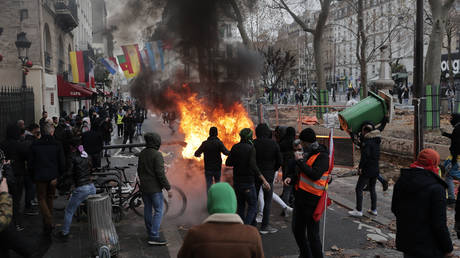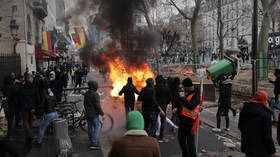Paris shooter admits ‘pathological hatred’ for migrants – prosecutor
The gunman who shot and killed three people in the French capital has admitted a long-standing “hatred of foreigners,” prosecutor said

Paris shooter admits ‘pathological hatred’ for migrants – prosecutor

The gunman who shot and killed three people in the French capital has admitted to investigators that the massacre was driven by his long-standing hatred of foreigners, the Paris prosecutor said on Sunday.
During questioning, the suspect allegedly said that he had developed a “hatred of foreigners that became totally pathological” following a burglary at his house in 2016, prosecutor Laure Beccuau said in a statement.
The 69-year-old man described himself as “depressive” and “suicidal,” and allegedly planned to kill himself with the last bullet. He initially sought to target the immigrant population in the northern Paris suburb of Seine-Saint-Denis, but changed his mind after seeing “too few people” in the area and finding his clothes too uncomfortable to reload the weapon quickly enough.
Instead, he opened fire at a Kurdish cultural center and a nearby cafe on Friday, killing two men and a woman, and injuring three others in the 10th district of Paris. Previously identified as “William M.” by French media, the retired train driver was reportedly armed with a US-made Army Colt 1911 pistol, along with several loaded magazines.
The prosecutor added that the investigators were forced to halt the questioning on “medical grounds” on Saturday, and transfer the suspect to a police psychiatric facility. In the meantime police conducted a search at his parents’ home, where he lived, but found no evidence linking him to “extremist ideology.”
However, authorities had previously acknowledged that the suspect had a history of violence against migrants, and had just recently been freed from detention while awaiting trial for a stabbing attack on a migrant camp in Paris a year ago. He was also convicted of armed violence in 2016 – a ruling which he appealed against.
The attack triggered mass unrest over the weekend, as shocked locals demanded justice and accused police of ignoring threats to the Kurdish community. The protest soon turned violent, with angry crowds pelting police with projectiles, overturning several cars and smashing shop windows. Police responded with tear gas and arrested at least 11 people in an attempt to quell the violence, and later said that over 30 officers were injured in clashes.












